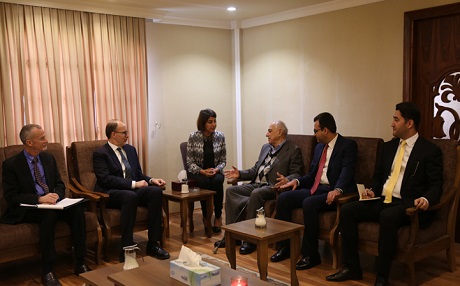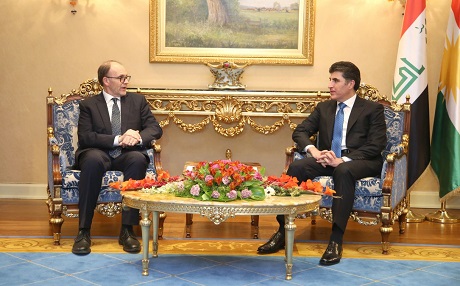ERBIL, Kurdistan Region – A delegation of three Kurdish opposition parties met with Iraqi Prime Minister Haider al-Abadi on Thursday in Baghdad to discuss problems between Erbil and Baghdad, such as the budget dispute. It is the first meeting between Abadi and a Kurdish delegation since Kurdistan voted to leave Iraq on September 25.
The Kurdish delegation found the visit necessary in order to put an end to the “political and financial crises” of the Kurdistan Region, read a joint statement from the three parties: Gorran, the Islamic Group (Komal), and the Coalition for Democracy and Justice (CDJ).
The Kurdish parties and the Iraqis confirmed that Abadi promised to pay the salaries of KRG employees after an audit is conducted as well as long overdue payment of farmers for their wheat.
The representatives of the three parties arrived in Baghdad on Wednesday in a bid to break the ice that has frozen relations between the central and regional governments.
“We discussed the protection of the achievements of the people of Kurdistan and the political framework of the Region,” the statement explained, adding that the keys to lasting peace are “real partnership” in decision-making in Iraq and reaching a radical solution to their problems in light of the constitution.
According to Abadi’s office, the Kurds threw their support behind a united Iraq.
“The delegation stated that they are convinced that Iraq should be unified and the problems must be solved within the framework of the Iraqi constitution,” read a statement from his office following the meeting.
The Kurdish delegation said they discussed the KRG’s share of the budget and salaries of the public employees, including the Peshmerga, with the prime minister.
“We requested Mr Abadi to put a limit to the suffering of the people and to turn a new political page as part of his duties and responsibility towards the citizens of the Kurdistan Region,” the delegation said.
They demanded Iraqi elections be held on time, May 12, adding that they “asked” Abadi to end fraud in “elections of Iraq and the Kurdistan Region.”
The Iraqi statement said the Kurdish delegation “congratulated Dr Haider al-Abadi on the victories made and for his wisdom of leadership in the war against the terrorist group of ISIS.”
The KRG is yet to comment on the three parties’ visit to the Iraqi capital independent of other parties and the government. Both Gorran and Komal withdrew from the coalition government, mainly because the KRG leadership refused to dissolve the cabinet and form an interim one.
Kurdish MPs, including those from Gorran and Komal, did not attend a session of the Iraqi parliament on Wednesday that was due to debate the 2018 draft budget law. They published a list of demands, including allocating 17 percent of the budget to the KRG and using the terminology “Kurdistan Region,” per the constitution.
The Kurdish delegation also met with Iraqi President Fuad Masum, a Kurd, Iraqi Parliament Speaker Salim al-Jabouri, a Sunni Arab, and Ammar al-Hakim, head of the ruling Shiite National Alliance.
They are scheduled to meet with Iraqi Vice President Nouri al-Maliki on Friday, Payam, a Komal media outlet, reported.
Jabouri stated on Wednesday that they will take the Kurdish concerns about the budget into consideration, adding that the parliament will hold talks with the Iraqi government on the matter.
Abadi had said on Tuesday that he will not allow the Kurdistan Region to receive 17 percent of the budget, insisting the amount must be determined by population ratios, arguing that the Kurdistan Region is less than 17 percent.
US Ambassador to Iraq Douglas Silliman, accompanied by US Consul General to Erbil Ken Gross, met with Gorran leader Omar Sayid Ali in Sulaimani on Thursday.
Ali told the Americans that the main ruling parties, the Kurdistan Democratic Party (KDP) and the Patriotic Union of Kurdistan (PUK), have failed in governing the Kurdistan Region. Gorran and its allies are the “alternative,” he said, reported Sbeiy, a Gorran media outlet.
He also asked the United States to help the Kurdistan Region to hold free and fair elections, especially cleaning the voter list which Gorran believes contains many irregularities.

undefined
US delegation meets with leaders from Kurdish Gorran party in Sulaimani on January 4, 2018. Photo: Sbeiy.
The US Ambassador met with PM Barzani and his deputy Qubad Talabani in Erbil on the same day. The two sides emphasized the need to maintain the recent calm following tensions between Erbil and Baghdad to pave the way for “serious dialogue” between the two governments, according to a statement from the KRG.
The US and KRG also discussed the need to “intensify efforts” to resolve the disagreement over Iraq’s 2018 budget and the issue of KRG state salaries.

undefined
US Ambassador to Iraq Douglas Silliman [L] meets with Kurdish Prime Minister Nechirvan Barzani in Erbil on January 4, 2018. Photo: KRG
The US delegation “welcomed” the fact that a joint delegation from Gorran and others visited the Iraqi capital today, according to the Gorran media.
The Kurdish delegation discussed the issue of the disputed areas in their meeting with PM Abadi with a focus on oil-rich Kirkuk and Tuz Khurmatu where many Kurds have been displaced since Iraqi forces took control in mid-October.
They asked Abadi to normalize the situation in the disputed areas to secure the safe return of Kurdish citizens and insisted the prime minister must fight any attempts to resume the process of Arabization.
Kurdish officials in late December sounded alarm over a new cycle of Arabization in the Kirkuk area. Iraqi officials claimed there was only an isolated case and they punished the military commander allegedly responsible.
Last updated at 11:25 p.m.





Comments
Rudaw moderates all comments submitted on our website. We welcome comments which are relevant to the article and encourage further discussion about the issues that matter to you. We also welcome constructive criticism about Rudaw.
To be approved for publication, however, your comments must meet our community guidelines.
We will not tolerate the following: profanity, threats, personal attacks, vulgarity, abuse (such as sexism, racism, homophobia or xenophobia), or commercial or personal promotion.
Comments that do not meet our guidelines will be rejected. Comments are not edited – they are either approved or rejected.
Post a comment